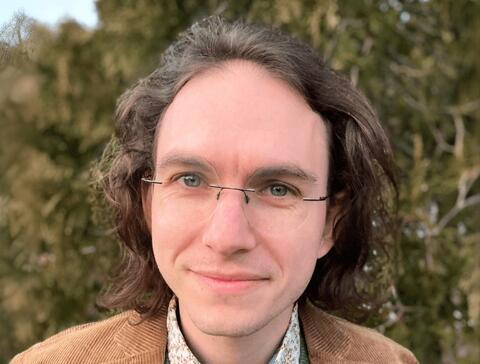Samuel Hodgkin
Biography
I am a literary scholar and cultural historian of medieval and modern Eurasia. My research deals with literature and criticism written in prestige languages (Persian and Russian) and vernaculars (especially Turkic languages). I am interested in classical Persianate poetry and its afterlife in modernist literature and literary institutions across Central and South Asia, the Caucasus, and the Middle East. I study and teach topics in genre and translation theory, canon formation, world literature, and historical poetics.
My first book, Persianate Verse and the Poetics of Eastern Internationalism (Cambridge University Press, December 2023), shows how the Soviet internationalist project of world literature emerged from sustained engagement between leftist writers of West and South Asia and state-sponsored writers of the multinational Soviet East, who drew on their shared Persianate literary training to articulate a postcolonial poetics of political representation. I have also published articles on lyric poetry, theater, anthologies, and translation practices in the modern Persianate zone. I am a co-organizer of the Cultures of World Socialism Working Group, and the editor of a special issue of Comparative Literature Studies based on our conversations entitled “Communist World Poetics” (2024). My own contribution to the issue discusses the institution of the national poet after the age of Romantic nationalism. I am also a published translator of poetry and literary criticism.
Education
B.A./M.A., Harvard University, 2008.
Ph.D., University of Chicago, 2018.
Publications
Persianate Verse and the Poetics of Eastern Internationalism (Cambridge University Press, 2023).
“How Modern is the Persianate?: Aesthetics and Politics of a Scholarly Category.” Comparative Literature Studies (CLS) 61, no. 4 (2024): 569-576.
“Theories and Methodologies: Pathways to Persotopias.” Co-authored with Aria Fani and Kevin Schwartz. PMLA 139, no. 2 (2024): 299-306.
“Introduction: Communist World Poetics.” CLS special issue, “Communist World Poetics,” ed. Samuel Hodgkin, 61, no. 2 (2024): 199-220.
“Romanticism, Internationalism, and the National Poet: Genealogies of Second-World Surrogacy.” CLS 61, no. 2 (2024): 246-275.
Translations and section introductions in Literary Modernity in the Persophone Realm: A Reader, eds. Christine Nölle-Karimi, Thomas Loy, and Roxane Haag-Higuchi (Vienna: Austrian Academy of Sciences, 2024).
Translations and section introductions in Tulips in Bloom: An Anthology of Modern Central Asian Literature, eds. Gabriel McGuire, Kristin Fort, Naomi Caffee, Emily Laskin, Samuel Hodgkin, and Ali F. İğmen (London: Palgrave, 2024).
“The Poetics of Persianate Disaffiliation: Recusative Gestures for a Royal Genre.” Philological Encounters 8, no. 2 (2023), special issue, “In the Wake of the Persianate”: 281-304.
“Soviet Persian Anthologies: Transnational, Multinational, International,” Iranian Studies 55, no. 3 (2022), special issue, Persian Classics in Modern Canons: 631-651.
“Persian Poetry in the Second-World Translation System.” In The Routledge Handbook of Persian Literary Translation, eds. Pouneh Shabani-Jadidi, Patricia J. Higgins, and Michelle Quay (Abingdon, UK: Routledge, 2022), 427-446.
“Classical Persian Canons of the Revolutionary Press: Abū al-Qāsim Lāhūtī’s Circles in Istanbul and Moscow,” in Persian Literature and Modernity: Production and Reception, eds. Arshavez Mozafari and Hamid Rezaei Yazdi (London and New York: Routledge, 2018), 185-212.
“Revolutionary Springtimes: Reading Soviet Persian Poetry, from Ghazal to Lyric,” in Iranian Languages and Literatures of Central Asia: From the Eighteenth Century to the Present, eds. Matteo De Chiara and Evelin Grassi (Paris: Association pour l’Avancement des Études Iraniennes, 2015), 273-305. “
“Romance, Passion Play, Optimistic Tragedy: Soviet National Theater and the Reforging of Farhad,” in Cahiers d’Asie centrale no. 24: Littérature et société en Asie centrale, ed. Gulnara Aitpaeva (Paris: Éditions Pétra, 2015), 239-266.
Works in Progress
My current book project, “The Garden in Spring: Reencounters with the World of Early Persian Poetics,” is an intellectual history of the problem of the origin of New Persian poetics, which takes seriously the contributions of 20th-century Iranian and Central Eurasian orientalists to genre theory and historical poetics. Articles currently in preparation deal with the idol as a rhetorical device in comparative Eurasian metapoetics, Middle Eastern poetic modernity beyond modernism, and the poetic personae of the Uzbek writer Hamid Ismailov. Other larger projects in development deal with the intellectual history of the spurious “Khazar hypothesis” and the leftist tradition of folkloristics and ethnomusicology across Eurasia.
